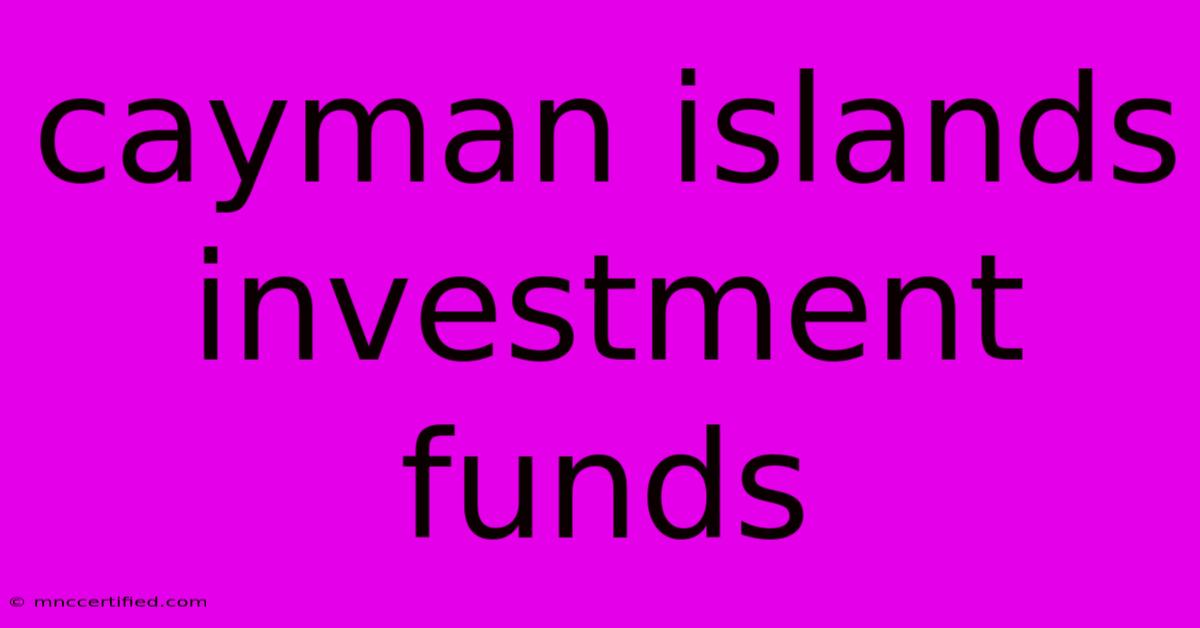Cayman Islands Investment Funds

Table of Contents
Cayman Islands Investment Funds: A Deep Dive into the Offshore Hub
The Cayman Islands have long been a prominent player in the global financial landscape, and a significant part of its success lies in its thriving investment fund industry. This article delves into the reasons behind the Cayman Islands' popularity as a jurisdiction for investment funds, exploring its advantages, regulations, and the different types of funds commonly established there.
Why Choose the Cayman Islands for Investment Funds?
Several factors contribute to the Cayman Islands' attractiveness as a location for establishing investment funds:
-
Established Legal and Regulatory Framework: The islands boast a sophisticated legal system based on English common law, providing a stable and predictable environment for investors. The Cayman Islands Monetary Authority (CIMA) plays a crucial role in regulating the industry, ensuring investor protection and maintaining international standards. This robust regulatory framework instills confidence in both domestic and international investors.
-
Tax Neutrality: A significant draw for many is the absence of direct taxation on investment funds and their underlying assets. This tax-neutral environment allows for greater returns for investors and enhances the Cayman Islands' competitiveness as a fund domicile. This tax efficiency is a key differentiator.
-
Confidentiality and Privacy: Cayman Islands law protects the confidentiality of fund structures and investor information, providing a level of privacy highly valued by many investors. This confidentiality, however, must be balanced with the increasing global scrutiny on transparency and anti-money laundering regulations.
-
Experienced Professionals: The Cayman Islands boasts a highly skilled and experienced workforce of lawyers, accountants, and other financial professionals specializing in fund administration and management. This expertise is vital for efficient and effective fund operation. Access to this specialized expertise is a considerable advantage.
-
Flexible Fund Structures: The Cayman Islands offer a wide range of flexible fund structures, catering to diverse investment strategies and investor needs. This adaptability allows for the creation of customized solutions, tailored to specific investment goals. From hedge funds to private equity funds and mutual funds, various structures are available.
Types of Investment Funds in the Cayman Islands
The Cayman Islands hosts a diverse range of investment fund structures, including:
- Hedge Funds: Known for their flexible investment strategies, hedge funds often employ complex trading techniques.
- Private Equity Funds: These funds typically invest in privately held companies, often with a long-term investment horizon.
- Mutual Funds: These funds pool money from multiple investors to invest in a diversified portfolio of assets.
- Real Estate Funds: Focusing on real estate investments, these funds offer exposure to the property market.
- Infrastructure Funds: Investing in infrastructure projects, these funds contribute to long-term economic development.
Navigating the Regulatory Landscape: CIMA's Role
The Cayman Islands Monetary Authority (CIMA) plays a vital role in regulating the investment fund industry. CIMA's oversight helps maintain investor confidence and ensures compliance with international standards. Understanding CIMA's regulations is crucial for establishing and operating a fund in the Cayman Islands. Compliance is paramount for maintaining a positive reputation and avoiding penalties.
Choosing the Right Structure: Key Considerations
Selecting the appropriate fund structure depends on several factors, including investment strategy, investor base, and regulatory requirements. Seeking professional advice from experienced legal and financial professionals in the Cayman Islands is essential for making informed decisions. Careful planning and expert guidance are vital for successful fund establishment.
Conclusion: The Cayman Islands' Continued Prominence
The Cayman Islands remain a highly sought-after jurisdiction for establishing investment funds, due to their favorable legal and regulatory environment, tax neutrality, and the availability of skilled professionals. However, navigating the regulatory landscape requires careful attention to detail and adherence to CIMA's guidelines. Understanding the different fund structures and their suitability for specific investment strategies is also crucial for success in this dynamic market. By carefully considering these factors, investors and fund managers can leverage the advantages offered by the Cayman Islands to build and manage successful investment funds.

Thank you for visiting our website wich cover about Cayman Islands Investment Funds. We hope the information provided has been useful to you. Feel free to contact us if you have any questions or need further assistance. See you next time and dont miss to bookmark.
Featured Posts
-
Jon Benet Case Netflix Directors Admission
Nov 26, 2024
-
Band Aids 40th Geldof Commemorates
Nov 26, 2024
-
What Is A Life Insurance Broker
Nov 26, 2024
-
Lana Del Rey Announces Stadium Tour
Nov 26, 2024
-
Landlord Insurance Water Damage
Nov 26, 2024